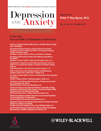ALCOHOL CONSUMPTION AND MAJOR DEPRESSION IN THE GENERAL POPULATION: THE CRITICAL IMPORTANCE OF DEPENDENCE
Abstract
Background
Substance use disorders and major depressive episodes (MDEs) often co-occur. Alcohol consumption may contribute to the aetiology of depressive episodes and/or vice versa. In Canada, the National Population Health Survey (NPHS) evaluated several aspects of alcohol use and MDE in a large population cohort over 12 years of follow-up. We evaluated the incidence of MDE in relation to different patterns of alcohol use, and examined the incidence of alcohol misuse in respondents with and without MDE.
Methods
The NPHS is a longitudinal study that began data collection in 1994 and whose cohort has been followed with biannual interviews. These interviews assess MDE using the Composite International Diagnostic Interview Short Form for Major Depression (CIDI-SFMD). Another CIDI-SF module assessed alcohol dependence during two interviews. Any alcohol consumption, exceeding moderate drinking guidelines and binge drinking were also assessed. We used logistic regression and proportional hazards models to assess longitudinal relationships between these variables
Results
Respondents with alcohol dependence were at higher risk of MDE, but any alcohol consumption, exceeding guidelines for moderate drinking and binge drinking were not. Respondents with MDE showed no increase of alcohol consumption, but the risk of alcohol dependence was elevated in depressed men.
Conclusion
Of direct clinical significance is the bidirectional relationship between alcohol dependence and MDE. Associations between alcohol consumption and MDE were not observed except when dependence was indicated. Alcohol dependence increased the risk of MDE, and MDE increased the risk of alcohol dependence, but only in men.




